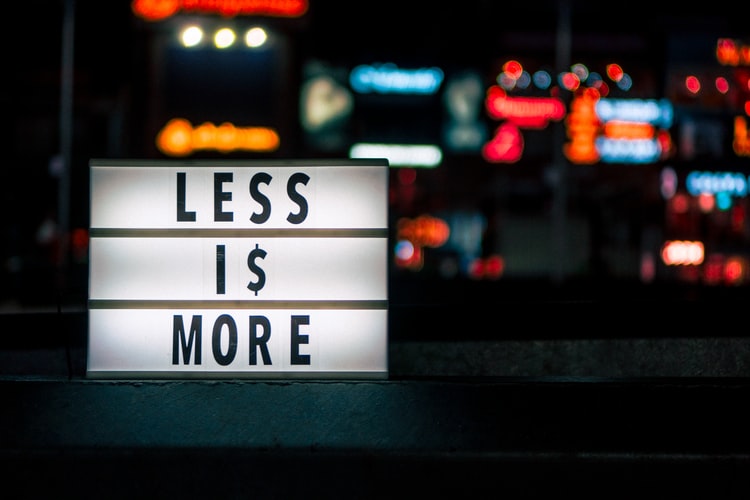“Overload is the disease of our time. Margin is the cure.” –Richard Swenson, M.D.
Probably my favorite thing in the world to do is backpacking.
For me, there is nothing quite like heading into the wilderness with no cell phone reception, and no daily agenda other than putting one foot in front of the other.
A few years ago, my good friend Adrian and I returned to one of our favorite destinations—Ten Lakes Basin in Yosemite.
It’s hard to describe how beautiful it is. Flowing streams and waterfalls cascading into the valley, with explosions of wildflowers carpeting the forest floor. We spent three days there wandering the valley.
Our plan on this trip was to hike off-trail and try to see all the lakes in the area.
We started early and had an incredible day of swimming, meditation, and great conversation.
Caught up in the elation of the day, the setting sun prompted us to find our way back to the trail. As we scrambled over rocks and boulders, we disagreed about which way would lead us back to the trail, and hurriedly picked up our pace.
I insisted we continue down the ravine, he wanted to head back up.
I didn’t want to stop because it was getting late. I was tired and wanted to get back to camp.
When we finally stopped for 10 minutes to check the map and GPS, we realized that going down would have required us to hike back up nearly 2000 feet in elevation to get back to our camp.
My instincts had been wrong—yet I felt so certain.
We were running out of time and my focus had narrowed. I was on autopilot and could only see the one route I had already fixed my sights on.
It didn’t dawn on me until later that many of us live and work this way.
Here is a critical lesson I learned that day—When we are running low on time and lose our bearing, we often pick up the pace instead of slowing down.
But accelerating won’t help you if you are heading the wrong direction.
Sometimes the fastest way to your destination is to stop and check your map and GPS.
But in order to check our heading, we must create margin.
Our culture loves to live in overload
Chronic busyness is so common today that “I’m busy” has become the standard response to “How are you?”
We are addicted to fitting it all in.
It doesn’t matter if you are a doctor, a plumber, a student, or a farm worker—people in the west are almost universally overcommitted.
Dr. Richard Swenson is a physician and researcher who has devoted his life to helping others understand the physical, emotional, financial, and spiritual costs of living in a state of chronic overload.
I highly recommend his bestselling book Margin: Restoring emotional, physical, financial, and time reserves to our overloaded lives.
The costs of living without margin are very real.
See if you recognize any of the signs and symptoms:
- When we live without margin in our finances, we live paycheck to paycheck without any money to cover the inevitable crises of life. Our only plan is to go deeper into debt.
- When we live with an overcommitted calendar, we feel trapped without any room to breathe or think. We go into survival mode and live on autopilot.
- When we live without recharging regularly, we can become irritable and impatient with the people we love.
- When we have no margin at work, Stephen Covey says that we never plan for the things that are important but not urgent. We simply exist to address the most pressing daily crisis and don’t make time to dream about taking our teams or careers to the next level.
- When we live without margin to sleep and exercise, our health and mood quickly deteriorate.
- Not having time to plan the vacation you desperately need.
- A racing mind that is constantly scanning your mental checklist for what you have to do.
- Living without margin is being 30 minutes late to your haircut, because you were 20 minutes late to the grocery store, because you were 10 minutes late dropping the kids off.
Alternatively, consider what it looks like to live with margin:
- Having enough money at the end of the month to save for emergencies or pay for purchases without using credit.
- Having time for a nap or a full night’s sleep to take on your day with maximum energy.
- Coming back from a workout in a better mood.
- Carving out time to think and plan for your future.
- Taking the time to plan a dream vacation.
- Having a day to recover when your vacation is over.
- Preparing well for a meeting at work so that you can make the most of the time.
- Having time to read, learn, and grow yourself for future opportunities.
- Setting aside time to plan the next chapter of your business or career.
- Having consistent dates with your spouse and time with your kids.
- Making time for meditation or prayer every morning.
The benefits of living with margin abound—at work, and at home.
Margin is largely about being more intentional with what we say YES and NO to.
Many people act as if they are simply victims of their calendars, as if they were not the people that said Yes to all those commitments!
I know because I lived this way for a long time. And it’s worth saying that even over-committing to the good things can leave you racing through your life at unsustainable speed.
I also believe that people want to follow leaders who are purposeful with their time. Leaders who are not frazzled, hurried, or chronically busy. It’s powerful modeling.
We often fail to see that the true cost of squeezing in one more thing is that we dilute the things that matter most.
The great irony of margin is that you are often wildly more productive when you deliberately do less!
Author Wayne Mueller poetically contends that when we eliminate the quiet spaces in our lives, we choke out the voice of deep inner wisdom that we would otherwise hear if we would only sit still long enough.
In short, living without margin nearly always brings more stress, and decisions that are made from a place of fear and survival. While living with margin almost always helps us show up for life with more energy, patience, and purpose.
Having more margin could help you plan your next business strategy, give you more time with your family, or help you realize you aren’t on course for the life you intended.
Question to ponder- Where do you need more margin in your life?
Turn information into action
- Admit that you are the one who says YES or NO to anything in your calendar.
- Schedule margin just like you would any other vital appointment.
- Several years ago when I read this book, I made a commitment not to respond to “How are you?” with “Busy!” I would give you the same challenge to stop using this as a response when people ask you how you are doing. This tiny shift has challenged me to think much more about any self-imposed busyness, and to make different choices.
Suggested Resources
- Margin by Richard Swenson, MD
- Sabbath by Wayne Mueller
- Developing the Leader Within You by John Maxwell




